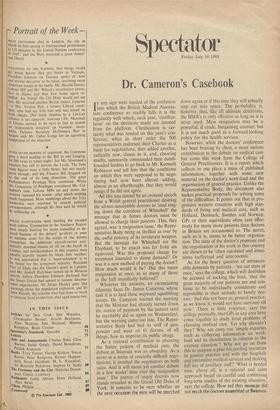Dr. Cameron's Casebook
IF any sign were needed of the confusion into which the British Medical Associa- tion conference so readily falls it is the regularity with which, each year, 'clarifica- tions' on the decisions made are intoned from the- platform. Clarification is cer- tainly what was needed on this year's con- ference, when in short order the 500 representatives endorsed their Charter as a basis for negotiations, then added another, radically new, clause to it, and, cheering madly, summarily commanded their dumb- founded leaders to go back to Mr. Kenneth Robinson and tell him that the conditions on which they were supposed to be nego- tiating had now been altered—adding, almost as an afterthought, that they would resign if he did not agree. All this was caused by an orotund speech from a Welsh general practitioner desiring the all-too susceptible doctors to 'send ring- ing down the corridors of Whitehall' the message that in future doctors must be allowed to charge their patients. This, they agreed, was 'a resignation issue,' the Repre- sentative Body being as thrilled as ever by the awful potency of its inveterate weapon. But the message for Whitehall (or the Elephant, to be exact) was far from un- equivocal. Was this proposed charge for treatment intended to damp demand? Or was it a new method of paying the doctor? How much would it be? Did this mean resignation at once, as so many of those in the hall manifestly believed?
Whatever the answers, an excruciating dilemma faces Dr. James Cameron, whose task it is to lead these wayward squabbling troops. Dr. Cameron warned the meeting that the Minister had already turned down the notion of payment by the patient (and he inevitably did so again on Wednesday), but the warning came too late. The Repre- sentative Body had had its sniff of gun- powder and went on to discuss, of all things, how to improve its public image.
As a rational contribution to planning the future pattern of medical care, the debate at Swansea was an absurdity. As a move in a series of crucially difficult nego- tiations, it insulted the negotiators on both sides. And it will mean yet another debate in a few weeks' time over the 'resignation issue.' The patron of angry doctors now stands revealed as the Grand Old Duke of York. It remains to be seen whether on the next occasion the men will be marched down again or if this time they will actually step out into space. The probability is, however, that, like all ultimate deterrents, the BMA's is only effective as long as it is never used. Mass resignation may be a powerful, if crude, bargaining counter; but it is not much good as a forward-looking policy for the health services.
However, while the doctors' conference has been beating its chest, a more serious contribution to the debate on medical care has come this week from the College of General Practitioners. It is a report which collects in one place a mass of published information, together with some new material on the doctor's work-load and the organisation of general practice. Unlike the Representative Body, the document also makes practical proposals for solving some of the difficulties. It points out that in pro- gressive western countries with high stan- dards of living and medical care, such as Holland, Denmark, Sweden and Norway, GPs or their equivalents often care effec- tively for many more patients than doctors in Britain are accustomed to. The secret, such as it is, seems to be better organisa- tion. The state of the doctor's premises and the organisation of his work in this country are shown to be 'often out-dated and some- times ineffectual and uneconomic.'
As for the hoary question of unreason- able demands by patients—'we can state at once,' says the college, which will doubtless be accused of rocking the boat, 'that the great majority of our patients are and con- tinue to be individually considerate and reponsible in their attitude to family doc- tors: had this not been so, general practice, as we know it, would not have survived till now.' There is little evidence, says the college pointedly, that GPs in any area have come together to study local problems of planning medical care. Yet why shouldn't they? Why not carry out 'simple inquiries such as collecting information on work- load and its distribution in relation to the existing situation”? Why not go on from this to prepare a plan for pooling resources in general practice and with the hospitals and preventive medical services and making full use of ancillary staff? 'What is needed now, above all, is a rational and calm approach based on careful and continuing long-term studies of the existing situation,' says the college. How sad that message did not reach the doctors assembled at Swansea.
















 Previous page
Previous page